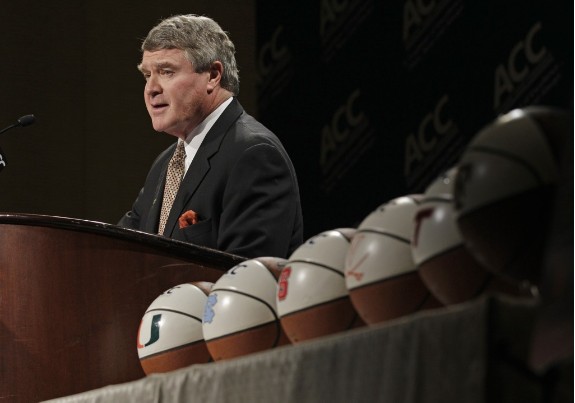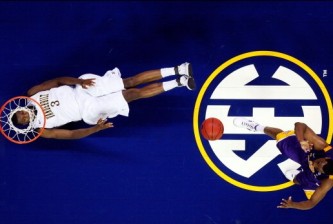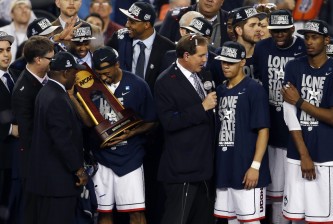
"Experience is the one thing you can't get for nothing." – Oscar Wilde
For months I've been beating the drum of the ACC. This is a conference poised to resume its position atop the college basketball landscape. It's not just the addition of Syracuse, Pitt and Notre Dame, and the associated collapse of the Big East. I'd be making the same claim if no new schools were coming or going.
Using Pomeroy as a measure for conference strength, the ACC could last be considered elite in the 2009-10 season when he had it ranked as the strongest conference from top to bottom. The following year it fell to 4th. Last year it dropped to 5th. During that time period – from No. 1 to No. 5 – nine of the twelve coaching positions underwent turnover. Virginia's Tony Bennett, who came aboard during that final elite season, is now considered one of the old guard in the conference. There's Coach K, Leonard Hamilton, and Roy Williams. And then the 4th longest tenured coach is Bennett.
And with all of the coaching changes, talent came and went, but mostly went. Players graduated. Players transferred. And the recruiting, while solid at the top, didn't keep pace in the middle ranks and at the bottom.
The ACC/Big Ten Challenge used to be a joke – the ACC won it in ten straight seasons. But then the Big Ten snuck out titles in 2009 and 2010. They dominated in 2011. And then this year, the ACC responded and secured a tie.
Pomeroy's ranking for this season: 3rd. So the decline stopped, but where is it going from here.
The recruiting I've covered. With new regimes in place nearly across the board, the conference has regained any lost momentum. Just check the link at the top of this story. The talent is there. But what about the experience?
Luckily, Ken Pomeroy has a smart way to measure experience. Instead of tallying the number of players each team has from each class (freshman, sophomore, etc…), he weights those numbers based on how many minutes each player is getting. Who cares if you have a senior if he never comes off the bench? And why call a team young if their four freshmen never play?
Using that metric, I looked at the six standard high-major conferences plus the Mountain West. These seven are the top conferences according to Pomeroy, and there's a bit of a drop to No. 8 which is the Atlantic 10. Starting with the average experience ranking, those conferences shake out like this:
The Mountain West averages as the most experienced conference of the seven, with an average rating of 150. There are 347 Division I teams, so on average, Mountain West teams are more experienced than most. And it's not driven by a few senior laden teams – six of nine MWC programs are above the NCAA median.
After the MWC there's a cluster for five of the other conferences. These range from the Pac 12 (193) to the SEC (213). So they're all slightly younger than the NCAA average.
Then there is the ACC. That conference comes in at an average over 255.
Looking within the conference, I calculated the percentage of minutes that seniors are currently playing for each team. Sure, the ACC won't only lose seniors after this season, but there is no reason to expect that the early entries and transfers will be significantly different than other conferences. In short, if few seniors are getting minutes this year, than next year's team will be more experienced.
Here's the chart:
It's easy to see why Miami and Duke are currently atop the standings. Miami is the 8th most experienced team in the nation, and over 62% of their minutes are coming from seniors. Duke is over 42%, while eight of the twelve schools are below 20%. Virginia and BC are below 10%.
The take home is that the ACC is doing a better job building top-to-bottom depth than any other conference, and they're also the youngest. Miami certainly won't be atop the conference next year, but there will be plenty of teams waiting in the wings.
And that doesn't even count the Big East defectors.






















